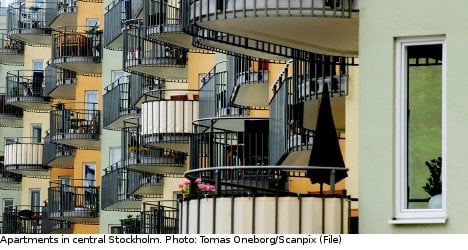Put simply, expats that navigate the rental market and get the best results are those who quickly accept and adapt to how it works in Sweden.
People who have a difficult time are often those who hold onto how things are done at home and work on those principles.
PHOTO GALLERY: Top five tips – looking to rent in Sweden
"What you need to understand is that Sweden doesn't have a market conducive for investment properties," Foxen-Stjernswärd says.
"Instead, it's dependent on Swedish owners' mobility and willingness to rent out their properties. That means limited choices and the fact that rental levels can be quite high, since landlords need to break even on their investment."
A law change in February this year, however, is benefitting rental homehunters with better terms for landlords, which has resulted in an increase in properties on the market for rent.
New rules on rent charges for sublets
For owned property (bostadsrätter, ägarrätter and houses) rent charges can now cover operating costs including monthly fees paid to the cooperative housing association (bostadsrättsförening), utilities, as well as a premium for wear and tear.
While the law doesn't specifically mention mortgages, property owners are allowed to charge for the "cost of capital", which is at the time of writing is considered around four percent of the property's market value.
If the property is a hyresrätt, the owner is allowed to charge their own rental costs plus an additional 10-15 percent if the property is furnished.
New rules for notification
For privately owned properties, the tenant may give one calendar month notice and the landlord may give calendar month's notice regardless of agreed upon lease term. In addition, tenants cannot assume that rental contracts are extended automatically and they must move out at the end of the contract even if they haven't received any formal notice from the landlord.
According to Foxen-Stjernswärd, the new laws have had a positive effect and fears of rental price increases have amount have amounted to nothing. In short, it's a huge market win.
"In comparison with 2012, we have experienced an 163 percent increase in landlord registrations this year to date, with a 21 percent increase in September alone," she says.
"We have noticed that expats have significantly more to choose from and have not noted price increases since many of those who rented out their properties prior to the law change charged market price anyway."
How Residensportalen can help
Since 2003, the Stockholm-based letting agency offers you a cutting edge tool to find your next home in Sweden.
With properties across the country, you can register for free, create a profile and browse the best rentals on the Swedish market.
Additional services include contract brokering, inventory documentation and property inspection.
Article sponsored by Residensportalen




 Please whitelist us to continue reading.
Please whitelist us to continue reading.